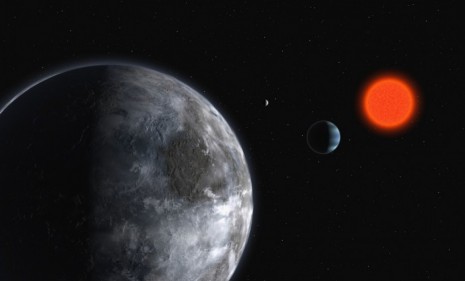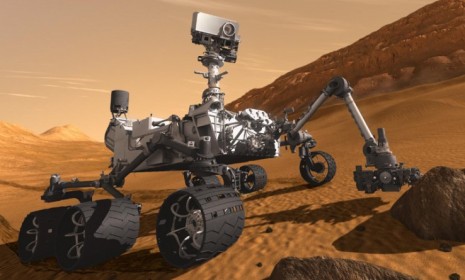The 'Goldilocks planet': Proof we're not alone?
Astronomers have found a planet with a climate conducive to life. Now, one of them claims to have recorded a "mysterious pulse of light" emanating from it

A free daily email with the biggest news stories of the day – and the best features from TheWeek.com
You are now subscribed
Your newsletter sign-up was successful
American astronomers say they've found a "Goldilocks planet" — that is, one with a climate "not too hot for liquid water, and not too cold," says Paul Butler at the Carnegie Institution. The planet, called Gliese 581g, is 20 light-years from Earth and should similarly be able to support life, says University of California at Santa Cruz astronomer Steven Vogt, the other lead scientist behind the discovery. (Watch a report about the discovery.) Here's an instant guide to Earth's distant twin:
What is the "Goldilocks planet" like?
It is larger than Earth — the astronomers say its mass is probably three to four times greater than that of our planet — but orbits a red dwarf star (Gliese 581) that is much smaller than our sun. One hemisphere of the planet always faces the star, while another always remains cloaked in eternal night.
The Week
Escape your echo chamber. Get the facts behind the news, plus analysis from multiple perspectives.

Sign up for The Week's Free Newsletters
From our morning news briefing to a weekly Good News Newsletter, get the best of The Week delivered directly to your inbox.
From our morning news briefing to a weekly Good News Newsletter, get the best of The Week delivered directly to your inbox.
Why are scientists so excited about it?
Because its climate is probably similar to ours here on Earth. Based on the researchers' findings, temperatures on Gliese 581g range between -31 to 158 degrees Fahrenheit, with more moderate weather prevailing in the perpetual dusk/dawn band between the dark and light sides of the planet — places one might expect to find liquid water and, potentially, life.
Do we have any any evidence of life on Gliese 581g?
No — although an Australian astronomer claims to have noticed a "mysterious pulse of light" emanating from its direction almost two years ago. Dr. Ragbir Bhathal says he recorded a "very sharp signal, sort of a laser lookalike thing" coming from Gliese 581g's direction during a scan of the skies in December 2008. Other scientists are dubious about Bhathal's claim. "When he first announced it, I asked him for the details, and he wouldn't send them to me," says astronomer Frank Drake, quoted at Fox News. "I'm very suspicious."
A free daily email with the biggest news stories of the day – and the best features from TheWeek.com
But what are the chances there is life there?
"100 percent," says Vogt. "I have almost no doubt about it." Sara Seager, an MIT astronomer who was not involved in the discovery, cautions that "any talk of life on Gliese 581g is pure speculation." Butler agrees that "any discussion of life at this point is of course speculative." But "that being said," he adds, "on Earth, anywhere you find liquid water you find life in abundance."
When will we know more?
The astronomers found Gliese 581g through an indirect "wobbly," or radial velocity, technique that observes how different planets' gravitational pulls affect the star they orbit, and we don't have the technology yet to confirm much about the finding. And sadly, "Earthlings won't be traveling to Gliese 581g any time soon," says CNN's Zain Verjee, since even if we could travel at the speed of light, it would take two decades to travel the 120 trillion miles. But Vogt says it's just a matter of time. "The fact that we were able to detect this planet so quickly and so nearby tells us that planets like this must be really common."
Sources: Scientific American, CNN, PC Magazine, USA Today
This article was originally published on October 4, 2010, and updated on October 12.
-
 The Week Unwrapped: Have televised confessions quelled protests in Iran?
The Week Unwrapped: Have televised confessions quelled protests in Iran?Podcast Plus, why has Elon Musk turned from Mars to the Moon? And will the BBC prove to be a puzzles champ?
-
 The week’s best photos
The week’s best photosIn Pictures An Andean god, a rogue squirrel, and more
-
 AI surgical tools might be injuring patients
AI surgical tools might be injuring patientsUnder the Radar More than 1,300 AI-assisted medical devices have FDA approval
